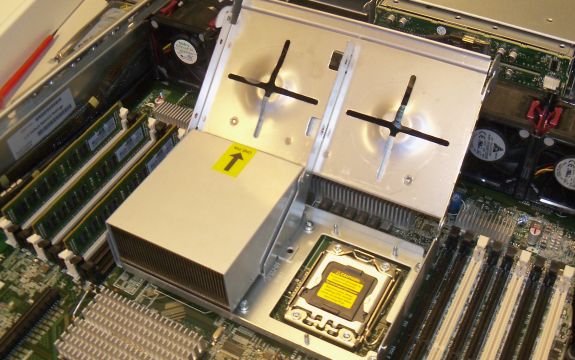Facebook's "Open Compute" Server tested
by Johan De Gelas on November 3, 2011 12:00 AM ESTBenchmark Configuration
HP Proliant DL380 G7
| CPU | Two Intel Xeon X5650 at 2.66 GHz |
| RAM | 6 x 4GB Kingston DDR3-1333 FB372D3D4P13C9ED1 |
| Motherboard | HP proprietary |
| Chipset | Intel 5520 |
| BIOS version | P67 |
| PSU | 2 x HP PS-2461-1C-LF 460W HE |
We have three servers to test. The first is our own standard off-the-shelf server, and HP DL380G7. This server is the natural challenger for the Facebook design, as it is one of the most popular and efficient general purpose servers.
As this server is targeted at a very broad public, it cannot be as lean and mean as the Open Compute servers.
Facebook's Open Compute Xeon version
| CPU | Two Intel Xeon X5650 at 2.66 GHz |
| RAM | 6 x 4GB Kingston DDR3-1333 FB372D3D4P13C9ED1 |
| Motherboard | Quanta Xeon Opencompute 1.0 |
| Chipset | Intel 5500 Rev 22 |
| BIOS version | F02_3A16 |
| PSU | Power-One SPAFCBK-01G 450W |
The Open Compute Xeon server is configured as close to our HP DL380 G7 as possible.
Facebook's Open Compute AMD version
| CPU | Two AMD Opteron Magny-Cour 6128 HE at 2.0 GHz |
| RAM | 6 x 4GB Kingston DDR3-1333 FB372D3D4P13C9ED1 |
| Motherboard | Quanta AMD Open Compute 1.0 |
| Chipset | |
| BIOS version | F01_3A07 |
| PSU | Power-One SPAFCBK-01G 450W |
The benchmark numbers of the AMD Open Compute server are only included for your information. There is no direct comparison possible with the other two systems. The AMD system is better equipped than the Intel, as it has more DIMM slots and uses HE CPUs.
Common Storage system
Each server has an adaptec 5085 PCIe 8x (driver aacraid v1.1-5.1[2459] b 469512) connecting to six Cheetah 300GB 15000 RPM SAS disks in a Promise JBOD J300s.
Software configuration
VMware ESXi 5.0.0 (b 469512 - VMkernel SMP build-348481 Jan-12-2011 x86_64). All vmdks use thick provisioning, independent, and persistent. Power policy is Balanced Power.
Other notes
Both servers were fed by a standard European 230V (16 Amps max.) powerline. The room temperature was monitored and kept at 23°C.











67 Comments
View All Comments
fpsvash - Thursday, November 3, 2011 - link
In the middle of the paragraph below the image caption, the sentence reads "...and offers better slightly better performance..."Other than that, nice post!
ahmetmy330 - Thursday, December 29, 2016 - link
this is my university work about open servers. Thanks for posthttp://www.h2kjamaica.com/maddenmobilehack/
InternetGeek - Thursday, November 3, 2011 - link
It's interesting that no many players have taken a look at Open Compute.alent1234 - Thursday, November 3, 2011 - link
it's a solution for a specific workload. there are still a lot of workloads that require the traditional model of big database serversunlike your bank, facebook's noSQL is not ACID
FunBunny2 - Saturday, November 5, 2011 - link
Well, yes a voice of reason. OTOH, the Facebook et al folks are convinced that their back to the COBOL era is the future. As if a toy application, albeit pervasive, is "innovation".Sivar - Saturday, November 5, 2011 - link
It's a little difficult to look at a comment about Facebook being a toy application and take it seriously. Yes, Facebook is not directly processing bank transactions on a Tandem, but their site is used to conduct business -- and is even the basis for many businesses, all over the world.Zynga, the company that makes a few annoying games for Facebook, is worth $15 -- more than Electronic Arts.
Nearly every major online publisher, including Anandtech, uses their API for content distribution and often as the entire forum system for discussion of publications.
The founder is the youngest billionaire in history.
Calling theirs a toy application sounds like a Blockbuster customer calling Redbox a toy. It's denial of an obviously successful, large, powerful, innovative company because they don't do things "the old way."
I suspect what matters more is that the business is executing flawlessly, the actual problems with data loss or other non-ACID compliant traditional issues are minimal, and that they are making enough money that Google and Microsoft are feel seriously threatened.
One last thing -- if you really look into what ACID compliance means (and I know you did not specifically mention the acronymn, but replied to someone that did) none of the current major DBMS's are truly ACID compliant. It's too slow. Not Oracle. Not MSSQL. Not Greenplum. Not Teradata. None of them. They may be closer than NoSQL or the like, but then it's all about the right tool for the job, right?
Ceencee - Wednesday, November 9, 2011 - link
This is true but ACID can be over-rated for many workloads. How many pieces of data HAVE to be consistent across the entire cluster to be valid? What about NoSQL with configurable consistency like Cassandra?NoSQL databases provide the holy grail of system growth which is horizontal scaling and this is no small thing for anyone who has worked with a very large RDBMS like ORACLE and implemented RAC to find it doesn't scale all that linearly for most workloads.
ahmetmy330 - Sunday, January 1, 2017 - link
ctually i assume you might have actually stumble upon these dubious <a href="http://www.h2kjamaica.com/bowlingkinghack/"&g... King cheats </a>programs and software packages downloads but are convinced usahmetmy330 - Thursday, January 12, 2017 - link
http://www.onslow.us/8ballpoolhack/I have told you
ac2 - Thursday, November 3, 2011 - link
Wouldn't the presence of the graphics on the HP server account for the 32W idle load savings?